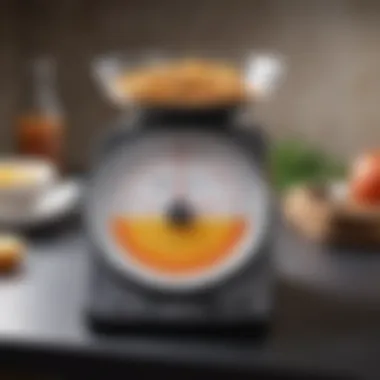The Ultimate Guide to Choosing a Commercial Kitchen Scale


Intro
In the realm of culinary precision, the importance of accurate measurements cannot be overstated. A commercial kitchen scale acts as an essential tool for both chefs and serious home cooking enthusiasts. The right scale streamlines the cooking process and ensures consistency across dishes. This guide delves into the best kitchen scales on the market. It highlights features, benefits, and techniques to enhance your food preparation. Whether you are a seasoned chef or simply looking to improve your kitchen efficiency, understanding these high-quality scales is valuable.
Recipe Overview
- Name: Culinary Precision with a Digital Scale
- Portions: Varies based on use
- Prep Time: Minimal effort needed
- Difficulty: Easy
- Main Ingredients: Various measurements of flour, sugar, spices, and liquids
Key Features of a Commercial Kitchen Scale
A kitchen scale is more than just a weighing tool. Here's what to consider when selecting one:
- Weight Capacity: The range should accommodate large batches of ingredients.
- Precision: Look for scales with a sensitivity of 0.1 grams for accuracy.
- Ease of Use: Digital displays should be clear, and unit conversion options are a plus.
- Durability: Materials used should ensure it can withstand the rigors of daily use.
Establishing these features as benchmarks will help you to choose a scale that fits your culinary aspirations.
Understanding Weight Measurement
Weight measurements may seem trivial to some. However, how you measure ingredients impacts taste and texture significantly. Get familiar with basic kitchen conversions. This can streamline multiple recipes and reduce errors.
Note: Solid foods as well as liquids should be measured correctly to enhance flavor and maintain desired consistency when cooking.
Selecting the Right Scale for Your Needs
Different scenarios may necessitate varying demands from kitchen scales. Consider what types of ingredients will be most often measured.
- Heavy Items: For instance, if you're working with larger items or bulk ingredients, scales with high weight limits are essential.
- Precise Recipes: For baking, a scale with a fine level of accuracy is necessary.
- Mobile Cooking: If you aunt traveling or have limited counter space, look for compact models that are easy to store.
Through understanding these factors, you lead your search for the right kitchen scale informed and ready.
Intro to Commercial Kitchen Scales
In any food preparation environment, the role of commercial kitchen scales cannot be understated. They offer precision and efficiency, elements that are crucial in achieving consistency in culinary results. These tools are not merely for measuring ingredients; they can directly influence the quality of dishes served to customers. Understanding different aspects of kitchen scales aids culinary enthusiasts and professionals in making informed decisions.
Definition and Purpose
A commercial kitchen scale is a device specifically designed to measure the weight of food ingredients accurately. Unlike typical household scales, these scales often come with features that cater to high-volume operations, making them vital for restaurants, catering services, and any food production facility.
Their purpose extends beyond simple ingredient measurement. They contribute to portion control, ensuring that each serving meets exact weight specifications. This has an immediate effect on food cost management, ingredient waste reduction, and overall kitchen productivity. With a proper kitchen scale, chefs can replicate recipes reliably, facilitating a higher standard in food production.
Importance in Culinary Practices
The significance of commercial kitchen scales in culinary practices is profound. Accurate measurements lead to delectable food preparation, ensuring that flavors and textures remain consistent. This is especially important when following intricate recipes that require precision. Moreover, scales help standardize portion sizes across dishes, allowing businesses to maintain a uniform experience for customers.
Additionally, pure efficiency becomes a factor. Saving time in the kitchen allows for higher output during busy service hours, ultimately affecting revenue. A business that relies on exact measurements will be more likely to meet health regulations and food safety standards. This, in turn, enhances customer trust.
"Highly accurate measurements reduce discrepancies and minimize waste."
As a result, understanding kitchen scales fosters a strategic approach to culinary processes. Each measurement becomes a foundational element in achieving culinary excellence.
Types of Commercial Kitchen Scales
Types of commercial kitchen scales are crucial for food preparation. Each type serves unique purposes and benefits certain culinary tasks. Understanding these types helps buyers make informed choices that enhance efficiency, reduce error, and support various cooking requirements. Let's explore the primary categories:
Digital Scales
Digital scales are known for their precision and user-friendly features. Many models come with LCD displays that make weight readings easy. The accuracy of these scales, usually within a fraction of a gram, is a priority for professionals. Additionally, some offer tare functions, which allow users to zero out the weight of containers.


Users of digital scales benefit from features like:
- High Precision: Ideal for recipes requiring exact measurements.
- Easy Conversion: Options to switch between metric and imperial units seamlessly.
- Memory Functions: Store weight measurements for quick reference.
These characteristics appear essential for culinary experts focused on consistency in their cooking.
Mechanical Scales
Mechanical scales, also called analog scales, function without power. They operate on springs and gears, making them durable and reliable. Their simplicity appeals to chefs who prefer low-maintenance tools. However, while they are effective, they may lack some precision compared to digital counterparts.
Mechanical scales take a few necessary points into consideration:
- Durability: Require no batteries and are less prone to malfunction; they can last for many years.
- User-Friendly Design: Often feature large weighing platforms, which can accommodate various bowl sizes.
- Limitations in Precision: Compared to digital scales, they may fall short in scenarios needing numerous decimal points.
Portable Scales
Portable scales are designed for convenience. Their lightweight and compact sizes make them ideal for varied cooking environments. Ideal for off-site events, culinary schools, and home cooking alike, these scales maintain functionality without sacrificing accuracy.
In assessing portable scales, you have:
- Mobility: Easy to transport for use in different locations.
- Versatility: Useful in a wide range of applications beyond just kitchen tasks, such as at farmer's markets or feed stores.
- Rechargeable Designs: Many models feature built-in batteries that offer extended use, adding to their practicality.
Bench Scales
Bench scales offer a larger platform, making them ideal for commercial settings where bulk ingredient measurement is necessary. These scales are used typically on a countertop or workstation, providing stability during use.
Key benefits of bench scales include:
- High Capacity: Suitable for weighing heavier items,
- Stability: Their flat surfaces enable precise weight readings without unnecessary movement.
- Integrative Features: Often come with interfaces for connecting to inventory systems, which can improve operations in busy kitchens.
Understanding these different types provides the foundation for selecting the ideal scale tailored to specific culinary needs.
Key Features to Consider
When selecting a commercial kitchen scale, understanding its key features can significantly impact culinary efficiency. The right scale is more than just a tool; it enhances precision in food preparation. Certain features can dictate how effectively a kitchen scale meets specific needs for culinary professionals. Here we cover primary attributes that one should evaluate:
Weight Capacity
Weight capacity determines the maximum weight the scale can handle. This feature is critical, especially for restaurants that deal with heavy ingredients, like bulk flour or large cuts of meat. Choosing a scale with an appropriate weight range is essential.
- Consider a scale that accommodates both small and larger loads for versatility.
- Common capacities range from a few grams up to several hundred kilograms.
- Make sure to choose a scale with a little more capacity than you expect to use regularly. This can save you from unnecessary stress and avoid overload.
Precision and Accuracy
Precision and accuracy are vital for consistent results in cooking. A high-quality scale offers precise measurements that help chefs replicate recipes accurately. Inconsistent weights can lead to variation in taste and texture. High-end scales can show measurement down to a few grams or ounces, which enhances your food quality.
- Look for scales with a clearly defined margin of error; typically, a margin within 1 gram is desirable.
- Knowing how artificially limited or expanded weight values affect your recipe is also key to culinary precision.
Ease of Use
A scale should be user-friendly. Busy kitchen environments can undermine efficiency owing to complicated interfaces or difficult readings. Consider your staff’s capability to operate the device quickly and efficiently before implementation.
- Large, well-placed buttons and prominent displays ensure easy reading during work.
- Automatic tare functions help eliminate excess manual work when measuring.
- Look for scales with simple setup and operational instructions, thus minimizing training time.
Durability and Build Quality
Scales in commercial kitchens must withstand constant use and the dining environment. Factors like materials and construction play vital roles in durability. Quality steel instead of plastic housing can endure falls and spills better. A solid build is non-negotiable when scaling maximum capacities frequently.
- Reviews, along with product specifications, often insight users on build quality.
- Weighted bases can also prevent tipping issues during use.


Calibration Features
Calibration is an essential part of maintaining scale accuracy. A scale out of calibration offers inaccurate measurement, risking recipe failures or customer dissatisfaction. Good scales offer an easy-to-interpret self-calibration process which ensures continued adaptability for precision.
- Scales equipped with a good calibration scale can be restored to their optimal condition easily.
- Regular calibration intervals should ideally be determined based on frequency of use.
Readability and Display Type
The display is an indispensable part of using a scale efficiently. A clear display enhances operational agility. What's visible at a glance plays a critical role in scales intended for busy commercial environments.
- LED or LCD displays provide the best clarity in dark and bright conditions.
- Features like weight hold, unit conversion, and backlighting can be particularly helpful for understanding and sometimes changing measurements at a quick glance.
Choosing the right commercial kitchen scale requires thorough consideration of these key features. Each chef's specific needs will dictate which features are most critical for them.
Top Commercial Kitchen Scales Reviewed
Commercial kitchen scales play a crucial role in achieving consistent and precise measurements in culinary operations. Selecting the right scale impacts not only the quality of food preparation but also the efficiency of any cooking process. In this section, you will find an analysis of various scales available on the market, considering specific elements that matter for chefs and culinary enthusiasts.
Product Comparisons
Understanding the diverse product lineup is essential before making a purchase. Different scales are designed with unique features, so comparisons highlight their strengths and weaknesses. Some examples include:
- Weighing accuracy: Some scales offer higher accuracy levels suited for bakery ingredients or intricate recipes.
- Weight capacity: Varying capacities dictate the types of foods and portions you can measure.
- Durability: Some models are built to endure heavy daily use, while others may be more suited for home use.
Established Brands
Click on respective links for more extensive data. Some well-known options are:
- Ohaus
- Myweigh
- Escali
These brands maintain strong market presence thanks in part to their ongoing commitment to quality and innovation.
User Ratings and Feedback
User ratings provide insights into real-life utilization and satisfaction. Following people’s firsthand experiences can guide new buyers; therefore:
- Look for verified user ratings to eliminate bias.
- Most consumers mention reliability and counterbalance between features and costs.
Average ratings on platforms such as Amazon often reflect overall sentiments about a specific model:
- Higher ratings might indicate product superiority.
- Look for recurring issues in lower-rated scales to avoid potential problems later.
Feedback from actual users sheds light on practical experiences with specific kitchen scales.
Top Picks Based on Performance
Based on a thorough analysis, you may find standout products aligned with performance standards:
- Ohaus Navigator NTEP: Notable for its accuracy, ideal for baking operations.
- Myweigh 400DL: Portable, reliable, and user-friendly, suitable for small cafes.
- Escali P115: Affordable yet precise, offering dependable performance in various kitchen settings.
Concluding this review segment, understanding market offerings allows chefs and food enthusiasts to select scales tailored for particular kitchen demands. Exploring all characteristics saves time and enhances pizza-making, patisserie, or general meal preparation efforts.
How to Maintain Your Kitchen Scale
Maintaining your kitchen scale is crucial for ensuring accurate and consistent measurements. Just like any tool used in a commercial kitchen, proper care extends the life of the scale and maintains its precision. In the busy environment of cooking, where every gram counts, neglecting maintenance can lead to significant issues in food prep and recipe fidelity.
There are two significant components of scale maintenance: cleaning practices and regular calibration. Adhering to these guidelines will safeguard the performance of your commercial kitchen scale, allowing for more efficient culinary procedures.


Cleaning Practices
A clean kitchen scale is vital for achieving accurate measurements. Food particles, moisture, and oils can affect not only the clarity of the scale’s readouts but also its functional integrity over time. Here are some effective cleaning methods:
- Wipe the Surface Regularly: Use a damp cloth or sponge to wipe the surface of the scale. Dry cloth should follow the damp one.
- Know Your Materials: Some scales have different surfaces, such as stainless steel, plastic, or glass. Use cleaner safe for these materials. Avoid abrasion, which can scratch the scale.
- Use Mild Cleaners: When necessary, dilute mild dish soap in water and then apply it. Chemical cleaners may damage some surfaces.
- Avoid Immersion: Never soak your scale in water. This can damage the electronic components.
- Clean After Use: It's good practice to clean the scale after each use or at least regularly throughout the day to prevent buildup.
By implementing these cleaning practices, the structure of the kitchen scale remains intact, and its accuracy is maintained over time.
Regular Calibration
Regular calibration is essential for ensuring that your kitchen scale maintains its precision. Even the smallest miscalibration may result in discrepancies that can affect large quantities of food. To keep your scale accurate, consider these points:
- Scheduled Calibration: Set regular times for calibration, such as weekly or monthly, based on the usage of the scale.
- Use Calibration Weights: A professional mass weight should be used for calibration. Verify the weight against the scale reading to check if it corresponds accurately.
- Humidity and Environment: Regularly check the environment's temperature and humidity. Extreme conditions can skew results.
- Service Professional: For highly precise scales, seek the expertise of a service professional for basic calibration every few months; they can help adjust your scale as needed.
Knowing proper calibration ensures ongoing confidence in food preparations and ingredient quantities. Keeping your scale clean and calibrated ultimately enhances your culinary effectiveness and efficiency. With these maintenance practices, you're ready to provide consistent and accurate culinary preparation, adhering to professional kitchen standards.
Regular care of your kitchen scale allows it to serve its purpose effectively, making all the difference in a high-stakes culinary world.
Regulatory Standards and Compliance
Understanding regulatory standards and compliance is critical when selecting a commercial kitchen scale. These regulations ensure that scales provide accurate and reliable readings, which directly impacts food preparation protocols and overall kitchen efficiency. Usage of compliant scales can help prevent costly mistakes, maintain food safety, and meet legal obligations within commercial settings.
Industry Standards for Accuracy
Accuracy is the cornerstone of effective kitchen scales. Various organizations dictate these standards, ensuring professional equipment, such as those used in restaurants and food production, adheres to strict guidelines to promote reliability. In the U.S., for instance, the National Institute of Standards and Technology (NIST) plays a significant role in defining measurement standards that calibrate scales to ensure precision.
Maintaining strict adherence to these guidelines offers several advantages:
- Enhanced customer satisfaction: Accurate measurements contribute directly to consistent food quality, which leads to positive customer experiences.
- Regulatory compliance: Using a scale certified according to NIST standards helps establishments adhere to food safety regulations and avoid potential legal repercussions, including fines.
- Effective costing: Precision measurements enhance portion control, aiding in resource management, and ultimately boosting profitability.
In commercial environments where bulk processing is common, being compliant with these standards is not just recommended; it is indispensable. A lapse in accuracy can be detrimental not only to operations but also to safety.
Certification Requirements
Certification remains a defining factor that both assures end-users of quality and fulfills any mandatory compliance needs in commercial kitchens. Certification indicates that the scale has been tested and meets predetermined industry benchmarks for performance and safety.
Depending on your location and the nature of your operations, certain certifications are necessary:
- NTEP Certifcation: The National Type Evaluation Program certifies commercial scales that comply with the relevant regulations and standards, ensuring their reliability in trade.
- ISO Certification: Specifically, ISO 9001 emphasizes good quality management practices. Scales that receive this certification are typically more reliable, which will improve overall measurement processes.
- CE Marking: In Europe, scales must meet European Union health and safety requirements to bear a CE mark, signifying that they are safe to use and comply with necessary specifications.
Compliance with certification requirements affects several areas in culinary practices:
- It fortifies brand trust among consumers and partners regarding food safety and quality assurance.
- It influences insurance liabilities, as certified scales often result in lower premiums and risks associated with mishaps arising from inaccurate weights.
- It provides essential product differentiation when marketing your food services.
In summary, understanding the significance of regulatory standards and compliance will help culinary businesses optimize their kitchen scales for maximum efficiency, safety, and consumer trust.
End
In this article, we have established the foundational role that commercial kitchen scales play in culinary practices. Their precision directly influences the quality of dishes and overall operational efficiency in kitchens.
Recap of Key Points
Understanding the necessity of accurate measurements in food preparation highlights several vital points:
- Types of Scales: Digital and mechanical scales serve distinctive needs. Portable scales add convenience for on-the-go needs, while bench scales cater to high-volume tasks.
- Must-Have Features: Consider precision, weight capacity, durability, and ease of use to ensure that your selected scale can handle varied ingredients and frequent use.
- Maintenance: Regular cleaning and calibration are crucial to maintain your scale's precision and longevity.
- Regulatory Compliance: Awareness of standards can help ensure that your measurements remain accurate, which is especially vital for businesses.
"The accuracy of measurements guides culinary success, affects cost-efficiency, and influences customer satisfaction."
Final Recommendations
When choosing a kitchen scale, take these recommendations into account:
- Assess your specific needs, including frequency of use and types of dishes prepared.
- Choose a scale with a suitable weight capacity that surpasses your usual needs.
- Opt for digital scales for ultimate precision, alongside features like tare functions and automatic shut-off for battery efficiency.
- Regularly maintain your scales, including cleaning to prevent residue buildup that could affect accuracy.
- Ensure the model complies with industry standards to enhance credibility in your culinary practice.
By incorporating these considerations, your kitchen scale can become an invaluable tool in enhancing cooking precision, efficiency, and ultimately, the satisfaction of those you serve.







